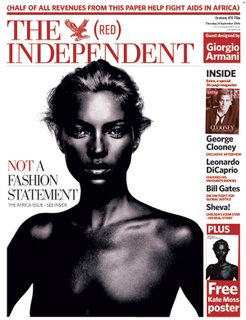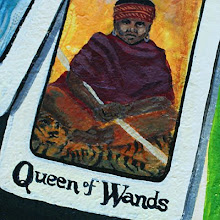Love the Skin You're In?

I was unsure about whether to speak about this topic because I had no idea what words to use. Earlier, when I only saw the Gwyneth Paltrow advertisement, I wrote the following into my Vox page:
Since I wrote about the Gwyneth Paltrow ad, I've had time to think about my response to it. I've also seen the Kate Moss cover above, taken from the UK's Independent. I buried myself in thought. I took my body, shut it in a rectangular box, and submerged myself into the dirt of my conscious mind. I searched into the recesses of my knowledge and tried to find a good reason for these advertisements. However, these advertisements call more attention to the ignorance of appropriation and blackface than any of the plights the many inhabitants in the countries of Africa are facing. Maybe these pictures can be tallied on the plight side of everything.The campaign did in fact have good intentions, but their intentions were executed poorly.
Attempts to defend the advertisement campaign, which also features celebrities like David Bowie and Kimora Lee Simmons, spotlight the fact that remotely, all of us are African descendants. Comparisons have been made to the advertising campaign made after 9/11, where people of different nationalities proclaimed to be American (presumably -- for all we know they could have all been American; I don't carry around my nationality detector), and advertising campaigns with assorted people claiming to be New Yorkers.
A common theme in all these awareness campaigns is the need to co-opt a certain situation as his/her/its own to feel properly sympathetic towards it and to inspire its viewers to action. Sort of a message sounding like, "you'd help yourself, wouldn't you?" or "you help if it were me, wouldn't you?" or "I've suffered; therefore we all suffer."
I am, and will always be, the first person to argue that the human condition shares a common thread. We all have more in common than we care to admit. However, I object to these advertisement campaigns. I think they're superficial and inspire people's narcissism rather than their activism.
If Gwyneth Paltrow was replaced by Average Schmoe #4847294, would I feel less prompted to act? Am I supposed to reach out to help the continent of Africa, specifically those within its countries who are suffering from AIDS, because Paltrow is topless and has donned a beaded necklace? What is she saying about Africans? What am I supposed to understand about her now being African? Where am I to find this righteous indignation for the suffering of Paltrow and her appropriated ilk?
The same questions arise when I think about 9/11 and the advertisements there. What metaphysical transformation have I undergone to share the plight of these people? 9/11 characterized a time when I felt terrible for the losses of New Yorkers affected directly by the attacks, but I did not want to be a New Yorker. I didn't even want to be American at that point. All the cards in our house of superiority fell fast, and I wanted to get the hell out of here.
I contributed to charities that supported the families hurt by 9/11, but I didn't do it because I transposed myself into the bodies of those people dying and those people whose tears wet the pavement as they look at a scarred cityscape. I contributed because it seemed like the human thing to do. I didn't need to see my ethnicity's face painted on the eyesore of 9/11. I don't need to see a continental identity painted on a white Hollywood celebrity, or anyone else for that matter. What happened to the days when atrocities and pandemics were horrific enough to create desires to help?
Whenever I see advertisements or enactments that transpose identities, it annoys me. I wonder who will tell the protesters who dress up like trees and animals that no one wants to be a tree or an animal. I wonder who will tell Oprah that contrary to popular opinion, a straight man cannot "be gay" for a period of time and know what it's actually like to experience those things from day to day. A white Hollywood starlet can't be one of the many inhabitants of Africa who suffer from AIDS, nor can she be one of the many inhabitants of North America who suffer from AIDS. If the thrust of these ad campaigns are true -- that we have forgotten Africa, that we haven't been attentive to AIDS, that there are constant sufferers and atrocities around the globe that need attention and funding -- borrowing someone's cultural, geographic, and/or ethnic identity is not the way to bring about that change. If anything, it merely calls attention to how shallow and superficial some cultures have become -- thinking that changing clothes or applying paint or claiming new locations alters who we are or how we're perceived.
I find it ironic and fitting that the most widely exposed and widely castigated advertisements I have seen for this campaign are white women. More telling, these advertisements feature an actress and a supermodel: professions famous and notorious for putting on different fabrics, different makeup, different ideas to make a statement. I wondered if Gwyneth Paltrow's movie career was suffering, so she decided to go topless (and get beads) for weeping Africa. I wondered if Kate Moss decided to burn herself black to illustrate the shortage of cocaine in jungle-painted, ebony-stained, beaten Africa. These women wouldn't go naked or charred for any reason, dear audience members; God, no, they did it for Africa!
I still don't know where my mind should go for these advertisements. I still feel no call to action for Africa and its pain. I feel a call to action to ask people to stop making racialized advertisements, remembering woefully the Sony fiasco of a few months' ago. I cringe at the cultural overtones of the larger white populace, and its "wax on, wax off" attempts at broadening perspectives. Gwyneth can only stay topless for so long before feeling the shame of men's eyes on her breasts and covering up in spite of the photographer's insistence of African solidarity. Kate Moss can only withstand enough stares within the black makeup before it cracks and reveals the expanse of white, starved skin that clings to her fashionable frame. And I still wonder what it means to live in a culture that reflects time and again the mocking lyrics of Jay-Z's song: change clothes and go. Superficiality will solve nothing in Africa or in America. Nothing.

0 Comments:
Post a Comment
<< Home